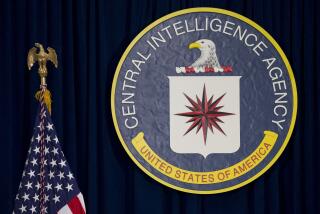Tenet Urges CIA to Resist Outsiders’ Interference
WASHINGTON — At a time when U.S. intelligence failures have prompted calls for sweeping reform, outgoing CIA Director George J. Tenet on Thursday delivered a farewell address to agency employees, urging them to resist unnecessary or unwanted changes.
“If people want to take us back in the wrong direction, then it is your voices that must be raised to say, ‘We know better and we will not stand for it,’ ” said Tenet, who is scheduled to step down in a few days. “This institution is your own. We who serve as your leaders are stewards for limited periods of time.”
Tenet’s remarks to more than 1,000 Central Intelligence Agency employees came before today’s scheduled release of a Senate report on intelligence failures that was said to be scathing in its criticism of the CIA and reportedly called for an overhaul of the way the U.S. intelligence community was run.
The Report on Pre-War Intelligence on Iraq, which runs more than 400 pages, is the culmination of a yearlong investigation by the Senate Select Committee on Intelligence. The inquiry was launched after it became clear that prewar assessments indicating Iraq had stockpiles of banned weapons were off the mark.
Describing the contents of the report, Sen. Carl Levin (D-Mich.), a member of the committee, said the CIA and other agencies would “properly be called to account for their failures.” The agency’s analytic work, Levin said in a written statement, “was way off, full of exaggerations and errors, mainly on weapons of mass destruction.”
The report is divided into sections on assessments of Iraq’s weapons program, its ties to terrorist groups, its alleged efforts to procure uranium from Africa and the hurried process by which the CIA produced a National Intelligence Estimate -- the agency’s most authoritative written judgment on a particular issue -- on Iraq in the months leading up to the war.
The agency is faulted for misreading the meaning of intercepts and satellite photos, for placing too much faith in the claims of defectors and for dismissing data that did not support preformed conclusions.
“They started with an assumption [that Iraq was still assembling banned weapons] and discarded evidence that was inconsistent with that,” said a congressional source familiar with the contents of the report.
In one case, the source said, the agency used information from an Iraqi scientist who said he had been involved in making a sort of “protein slurry” but insisted that he was unaware of any efforts to make biological weapons. “They just disregarded that part and used him as a primary source to make the case there is a bio-weapons program,” the source said.
CIA officials have defended the agency’s prewar estimates.
During his speech, Tenet alluded to the forthcoming Senate report, saying: “In the end, the American people will weigh and assess our record -- where intelligence has done well and where we have fallen short. And, aware of the difficulties and limitations we face, they will honor and recognize your service.”
Tenet has served as director of central intelligence for seven years, longer than all but one of his predecessors. His comments urging employees to resist unwelcome changes came during a passage of his speech in which he was recounting accomplishments during his tenure, including the expansion of the agency’s clandestine service and improvements in recruitment, training and operations.
A CIA spokesman said Tenet was referring to personnel practices at the agency and that his remarks did not intend to suggest that employees ignore politicians’ guidance.
In the past, Tenet had been critical of proposals to create a new Cabinet-level position that would oversee all 15 agencies in the intelligence community and outrank the director of central intelligence.
Citing personal reasons, Tenet announced last month that he would step down Sunday. He will be replaced on an interim basis by deputy director John McLaughlin. The farewell ceremony, at CIA headquarters in Langley, Va., was closed to reporters, but the agency released the text of Tenet’s remarks.
The Senate report, which focuses on the prewar data collection and analysis by the intelligence community, finds no evidence that the agency tailored its assessments in response to political pressure. But the report does not address the use of intelligence by Bush administration officials to make the case for war with Iraq. The Republican-controlled Senate committee is to examine that issue in a follow-up investigation.
Democrats have accused the White House of misleading the public by exaggerating the threat from Iraq and overstating its ties to the Al Qaeda terrorist network responsible for the Sept. 11 attacks.
Casting fresh doubt on a key component of such claims, Levin released a letter from Tenet in which he said the agency did not believe that Mohamed Atta -- the reputed ringleader of the attacks -- met with an Iraqi agent in Prague before the attacks.
“Although we cannot rule it out, we are increasingly skeptical that such a meeting occurred,” Tenet said in the letter, dated July 1 and written in response to a request from Levin.
The credibility of the source of the claim “has been questioned,” Tenet said, and the Iraqi agent who is alleged to have taken part in the meeting -- and who is now in U.S. custody -- “has denied ever having met with Atta.”
“We assess that Atta would have been unlikely to undertake the substantial risk of contacting any Iraqi official as late as April 2001, with the plot already well along toward execution,” the letter said.
Shortly after the Sept. 11 attacks, Vice President Dick Cheney said the Prague meeting had been “pretty well confirmed.” More recently, he has said the allegation that there was such a meeting has “never been proven; it’s never been refuted.”
More to Read
Sign up for Essential California
The most important California stories and recommendations in your inbox every morning.
You may occasionally receive promotional content from the Los Angeles Times.









